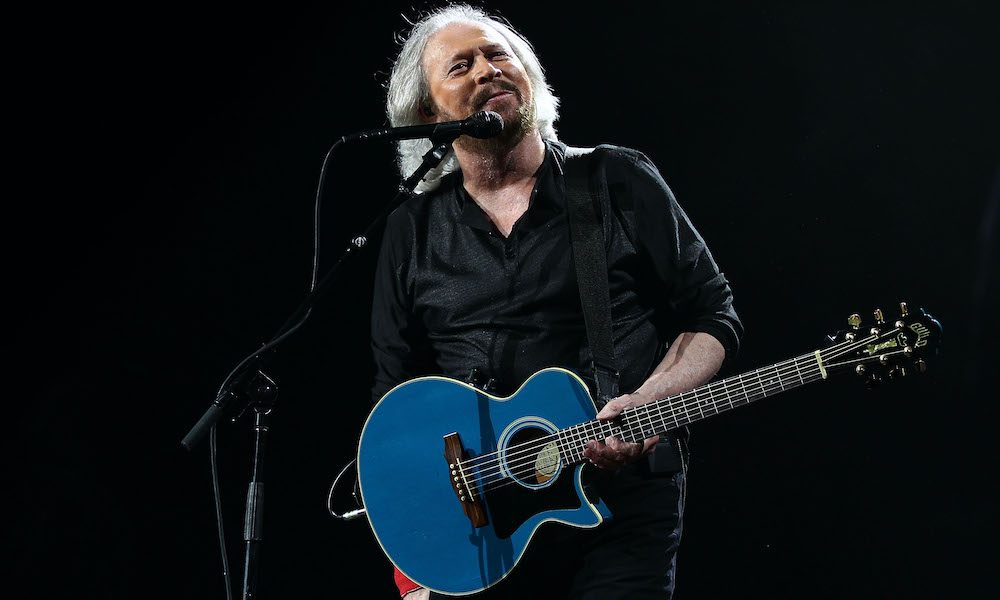Robin Gibb, born on December 22, 1949, on the Isle of Man, was one of the defining voices of 20th-century popular music. As a co-founding member of the Bee Gees, along with his brothers Barry and Maurice, he helped create one of the most successful and influential groups in the history of pop and disco. His unique vibrato, emotional delivery, and gift for songwriting not only distinguished him as a performer but also cemented his place as a cultural icon whose influence stretched across generations.
From an early age, Robin showed a strong passion for music. The Gibb family moved from the Isle of Man to Manchester, England, before relocating to Australia in the late 1950s. It was in Australia that Robin and his brothers began to develop their musical act, performing together under the name “Bee Gees” (short for “Brothers Gibb”). Their early years were filled with experimentation, but it quickly became clear that Robin’s hauntingly distinct voice gave the group an emotional edge. By the mid-1960s, the Bee Gees had secured a record deal and started to make waves internationally.

Robin’s vocal style stood apart from Barry’s falsetto and Maurice’s harmonies. While Barry often carried the high, soaring notes of the Bee Gees’ disco era, Robin’s vibrato brought a sense of melancholy and raw emotion that defined many of the group’s earlier ballads. Songs like Massachusetts (1967), I Started a Joke (1968), and New York Mining Disaster 1941 (1967) showcased his unique ability to convey vulnerability and storytelling through song. These tracks became enduring classics, largely because of Robin’s singular voice.
The Bee Gees’ career reached unprecedented heights in the 1970s with the rise of disco, particularly through their contributions to the Saturday Night Fever soundtrack (1977). While Barry’s falsetto dominated much of that period’s biggest hits—such as Stayin’ Alive and Night Fever—Robin’s influence remained crucial. His songwriting partnership with his brothers resulted in some of the most iconic pop and disco records ever produced. Beyond their own catalog, the Bee Gees wrote hits for other artists, including Islands in the Stream for Kenny Rogers and Dolly Parton, and Heartbreaker for Dionne Warwick. Robin’s lyrical sensibility added a poetic dimension to the group’s work, helping to define the sound of a generation.
Despite the group’s phenomenal success, Robin also pursued solo projects throughout his career. His first solo album, Robin’s Reign (1970), featured the haunting single Sav

ed by the Bell, which highlighted his ability to craft deeply personal, introspective songs. In the 1980s, he continued his solo journey with albums like How Old Are You? (1983), which included the hit single Juliet. These ventures demonstrated that Robin was more than just one-third of the Bee Gees—he was an artist in his own right with a distinct voice and vision.
The Bee Gees faced challenges in the 1980s as disco’s popularity waned, but Robin and his brothers proved resilient. They reinvented themselves by shifting back to pop ballads and soft rock, with hits like You Win Again (1987), which topped charts in Europe. Robin’s adaptability and willingness to evolve musically played a key role in ensuring the group’s longevity. Even as music trends changed, the Bee Gees remained relevant, largely due to their unmatched ability to craft timeless melodies.
Tragedy struck the Gibb family over the years, with the loss of younger brother Andy Gibb in 1988 and later Maurice in 2003. Robin was deeply affected but continued to carry on musically, performing both solo and in collaboration with Barry. He worked tirelessly to preserve the Bee Gees’ legacy while also contributing to humanitarian efforts, particularly through his involvement with charities and causes close to his heart.
Robin’s final years were marked by health struggles, including a battle with cancer. Yet even in the face of illness, his passion for music never wavered. He continued recording, performing, and planning new projects, determined to remain creative. His resilience and dedication inspired not only fans but also fellow musicians who admired his courage and artistry.
Robin Gibb passed away on May 20, 2012, at the age of 62, leaving behind a monumental legacy. Tributes poured in from around the world, recognizing his role as one of the voices that shaped modern popular music. His songs—both with the Bee Gees and as a solo artist—continue to resonate, carrying with them the emotional depth and lyrical beauty that defined his career.
More than a singer or songwriter, Robin Gibb was a storyteller. Thro

ugh his music, he captured the complexities of love, loss, and longing, giving listeners around the world a soundtrack to their own lives. His distinctive voice remains instantly recognizable, a reminder of a time when the Bee Gees reigned supreme on global charts and transformed the landscape of pop and disco.
Robin’s career is ultimately a testament to creativity, resilience, and innovation. His ability to evolve with changing times while staying true to his artistic identity ensured that his work would endure long after his passing. Today, his influence can be heard in the music of countless artists who draw inspiration from the Bee Gees’ harmonies and melodies.
In the end, Robin Gibb will always be remembered as more than just a member of one of the greatest bands in history. He was a pioneer whose voice and vision helped define an era, and whose legacy continues to shine brightly in the story of popular music. His life’s work is not only preserved in records and charts but also in the hearts of millions who continue to be moved by the songs he left behind.